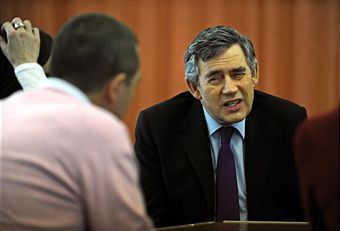 Labour’s tax on banks that pay bonuses has failed to change behaviour and so will raise significantly more money, roughly two and a half billion more, than the Treasury budgeted that it would. How Labour uses this extra revenue will tell us a lot about how Labour intend to campaign and the balance of power within the government.
Labour’s tax on banks that pay bonuses has failed to change behaviour and so will raise significantly more money, roughly two and a half billion more, than the Treasury budgeted that it would. How Labour uses this extra revenue will tell us a lot about how Labour intend to campaign and the balance of power within the government.
At Brown’s press conference, Gary Gibbon pressed the Prime Minister on whether this money would all be earmarked for deficit reduction, the option that those close to Darling prefer. Noticeably, Brown failed to endorse that idea. He also would not commit to using any other extra revenue exclusively for deficit reduction. The significance of this is that there are rumours floating around that a bank might be sold before the election. This would provide the government with a significant chunk of money that could fund some pre-election goodies.
The political appeal for Brown in this is obvious. He would use it as an opportunity to say that not only did saving the banks prevent a depression but that it will make the taxpayer a profit in the long run. However, selling a bank now is not going to maximise revenue. One imagines that UKFI, which manages the government’s shareholding in the banks, would not be keen on such a move and its key staff would be very reluctant to go along with it.







Comments